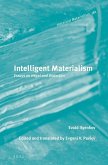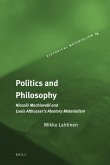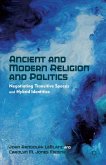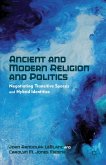- Gebundenes Buch
- Merkliste
- Auf die Merkliste
- Bewerten Bewerten
- Teilen
- Produkt teilen
- Produkterinnerung
- Produkterinnerung
Rehmann provides a comprehensive Gramscian socio-analysis of Max Weber's political and intellectual position in the ideological network of his time. He deciphers Weber as an organic intellectual who constructs a new bourgeois hegemony in the transition to 'Fordism'.
Andere Kunden interessierten sich auch für
![Critical Practice from Voltaire to Foucault, Eagleton and Beyond Critical Practice from Voltaire to Foucault, Eagleton and Beyond]() John E O'BrienCritical Practice from Voltaire to Foucault, Eagleton and Beyond223,99 €
John E O'BrienCritical Practice from Voltaire to Foucault, Eagleton and Beyond223,99 €![Intelligent Materialism Intelligent Materialism]() Evald IlyenkovIntelligent Materialism188,99 €
Evald IlyenkovIntelligent Materialism188,99 €![Confronting Gouldner Confronting Gouldner]() James J ChrissConfronting Gouldner200,99 €
James J ChrissConfronting Gouldner200,99 €![Politics and Philosophy Politics and Philosophy]() Mikko LahtinenPolitics and Philosophy201,99 €
Mikko LahtinenPolitics and Philosophy201,99 €![Ancient and Modern Religion and Politics Ancient and Modern Religion and Politics]() J. LeBlancAncient and Modern Religion and Politics37,99 €
J. LeBlancAncient and Modern Religion and Politics37,99 €![Ancient and Modern Religion and Politics Ancient and Modern Religion and Politics]() J. LeBlancAncient and Modern Religion and Politics37,99 €
J. LeBlancAncient and Modern Religion and Politics37,99 €![Degeneration and Revolution Degeneration and Revolution]() Robert HeynenDegeneration and Revolution309,99 €
Robert HeynenDegeneration and Revolution309,99 €-
-
-
Rehmann provides a comprehensive Gramscian socio-analysis of Max Weber's political and intellectual position in the ideological network of his time. He deciphers Weber as an organic intellectual who constructs a new bourgeois hegemony in the transition to 'Fordism'.
Hinweis: Dieser Artikel kann nur an eine deutsche Lieferadresse ausgeliefert werden.
Hinweis: Dieser Artikel kann nur an eine deutsche Lieferadresse ausgeliefert werden.
Produktdetails
- Produktdetails
- Verlag: Brill
- Seitenzahl: 460
- Erscheinungstermin: 28. Oktober 2014
- Englisch
- Abmessung: 239mm x 163mm x 28mm
- Gewicht: 839g
- ISBN-13: 9789004271791
- ISBN-10: 9004271791
- Artikelnr.: 42059365
- Herstellerkennzeichnung
- Produktsicherheitsverantwortliche/r
- Europaallee 1
- 36244 Bad Hersfeld
- gpsr@libri.de
- Verlag: Brill
- Seitenzahl: 460
- Erscheinungstermin: 28. Oktober 2014
- Englisch
- Abmessung: 239mm x 163mm x 28mm
- Gewicht: 839g
- ISBN-13: 9789004271791
- ISBN-10: 9004271791
- Artikelnr.: 42059365
- Herstellerkennzeichnung
- Produktsicherheitsverantwortliche/r
- Europaallee 1
- 36244 Bad Hersfeld
- gpsr@libri.de
Jan Rehmann, Dr. phil., habil., teaches critical theories and social analysis at Union Theological Seminary in New York City and philosophy and the Free University in Berlin. He is co-editor of the Historical-Critical Dictionary of Marxism (HKWM) and the journal Das Argument. His latest book is Theories of Ideology. The Powers of Alienation and Subjection. (Brill: Leiden, Boston 2013).
Preface to the English Edition
Introduction to the First Edition (1998)
PART ONE: THE MODEL OF AMERICANISM
1.1 Weber's 1904 Journey to America
1.2 The Ambivalent Fascination of Capitalism
1.3 Taylorism and Fordism in the Stockyards
1.4 The Alliance of Religion and Business
1.5 The 'Displacement' of Religion from the State into Civil Society (Marx)
1.6 The Sect as Germ Cell of a Superior Model of Societalisation
PART TWO: OUTLINES OF A FORDIST PROJECT OF MODERNISATION FOR GERMANY
2.1 The Programme of the 1895 Freiburg Inaugural Address
2.2 The Katheder Socialist Milieu
2.3 The Imperialist Critique of the Agrarian Class
2.4 A Homogenous Stock Market Elite with a Coherent Concept of Honour
2.5 The Critique of the 'Passive Revolution' in Germany
2.5.1 The 'Entailed Estate'
2.5.2 The 'Feudal Pretensions' of the German Bourgeoisie
2.5.3 Caesarism, Bonapartism and 'Passive Revolution'
2.6 Proposals for the Development of a 'Caesarism without a Caesar'
2.6.1 The Shortcomings of a 'Value-Rational' Critique of Weber
2.6.2 'Universal Bureaucratisation' as an Ineluctable Fate
2.6.3 Parliamentarism as a Superior Mechanism for the Selection of Leaders
2.6.4 The Construction of an Industrial Bloc of Capitalists and Workers
2.6.5 A New Model for the 'Assimilation' of Hostile Groups into the State
2.7 The Integration of the Modern Industrial Proletariat into Bourgeois
Society
2.7.1 Paul Göhre's Study on the Heterogeneity of Social Democratic Common
Sense
2.7.2 'Class Struggle' as a Mode of Integration into Bourgeois Society
2.7.3 Linking 'Worker Honour' to the Force Field of Nationalism
2.7.4 The Absorption of the Labour Aristocracy into the Bourgeoisie
2.7.5 A Graduated System of Corporatist Cooptation
2.8 The Return of the Charismatic 'Caesar' to Modern Politics
2.8.1 The Verticalist Narrowing of the Concept of Charisma
2.8.2 Plebiscitary Charisma as Correlate of the Party Machine
2.8.3 From the Parliamentary Selection of Leaders to 'Plebiscitary Leader
Democracy'
PART THREE: FROM THE NEO-KANTIAN PHILOSOPHY OF VALUES TO THE WEBERIAN
'THEORY OF SCIENCE'
3.1 Formulating the Question in Terms of a Critical Theory of Ideology
3.1.1 A New Scientific Beginning on a Neo-Kantian Foundation
3.1.2 Controversies Surrounding the Relationship between Weber and Rickert
3.1.3 Paradigm Shift from the History of Ideas to a Critical Theory of
Ideology
3.2 Theory of Reflection and Transcendental Idealism - An Epistemological
Rendezvous manqué
3.2.1 The 'hiatus irrationalis' between Concept and Reality
3.2.2 The Critique of the Subject/Object Dichotomy in the 'Theses on
Feuerbach'
3.2.3 The Sublation of the Kantian A Priori within the Concept of the 'Form
of Thought'
3.2.4 Gramsci's Critique of Objectivism
3.2.5 F.A. Lange as Secret 'School Leader'?
3.3 The Dualism of Law-Determined 'Nature' and Value-Determined 'Culture'
3.3.1 The Common 'German-Italian' Front against 'Anglo-French' Naturalism
3.3.2 The Neo-Kantian Taboo on Social Laws
3.3.3 Competing with Dilthey
3.3.4 The Displacement of History and Culture into the Sphere of
Ideological Values
3.3.5 The Distance between Kant and Rickert
3.4 The 'Value Relation' as Bearer of 'Freedom from Value Judgements'
3.4.1 A Commonality with Marx's Standpoint of Science
3.4.2 The Transposition of Ideological Values into the Theoretical 'Value
Relation'
3.4.3 Ideological 'Value-Affectedness' as a Condition of Admission to
Science
3.5 Farewell to the Abstract Heaven of Ideas - Outlines of a Philosophical
Paradigm Shift
3.5.1 The System of Values as Neo-Kantianism's Weakest Link
3.5.2 Croce's 'Ethico-Political History'
3.5.3 The Turn from the Neo-Kantian Philosophy of Values to Neo-Hegelianism
and Hermeneutics
3.5.4 The Lacuna in the Critique of Southwest German Neo-Kantianism
3.6 From the System of Values to the 'Clash of Values' - Weber's
Reorganisation of the Neo-Kantian Philosophy of Values
3.6.1 The Ambivalence of the Value-Decisionist Concept of the Subject
3.6.2 The Limits of Weberian Historicisation
3.6.3 The Eternal Struggle over Values - Weber and Nietzsche
3.7 Weber's Concept of Spheres of Value as a Modernisation of Ideological
Societalisation
3.7.1 Ideology's 'Law of Complementarity'
3.7.2 Weber's Concept of Spheres of Value and the German 'Power Pragma'
During the First World War
3.7.3 The Dichotomy of the Ethics of Conviction and the Ethics of
Responsibility as an Ideological Pitfall
3.8 Ideal-Typical Conceptualisation's Blind Spot
3.8.1 The Ideal Type as a Deliberately One-Sided Conceptual Construct
3.8.2 The Rendezvous Manqué with Marx
3.8.3 The Capitalist Orientation of Sociological Ideal Types
PART FOUR: THE IDEAL-TYPICAL CONSTRUCTION OF AN ORIGINARY
PROTESTANT-CAPITALIST SPIRIT
4.1 The Ethico-Political Stakes of a 'Purely Historical Account'
4.2 The Basic Operation: Isolation of the 'Mental and Spiritual
Particularities'
4.2.1 The Critique of Offenbacher's Comparison of Denominations
4.2.2 On the Social Profile of the Catholic Bloc
4.2.3 Weber's Departure from Offenbacher's Model of Interaction
4.2.4 Weber's Vacillation between a 'Strong' and a 'Weak' Thesis on
Protestantism
4.2.5 The Ethical Mobilisation of Economic Subjects
4.3 From German 'Cultural Protestantism' to Anglo-American 'Civil Religion'
4.3.1 Cultural Protestantism as a Religious Ideology of Bourgeois
Modernisation
4.3.2 'Kulturkampf' and the 'Debate on Inferiority'
4.3.3 Protestant 'Culture' as an Integrational Cipher in the Crisis of
Orientation
4.3.4 Ritschl and Weber: A New Arrangement of Ethical Resources
4.3.5 Jellinek and Weber: Linking up with Anglo-American Mythistory
4.4 Weber and Simmel: The Psychological 'Deepening' of Marxian Value Form
Analysis
4.4.1 Benjamin Franklin's Ethos - Utilitarian or Puritan?
4.4.2 From the Capitalist Standpoint of Valorisation to the 'Human'
Interest in Acquisition
4.4.3 The Formal Resemblance of Money and God
4.4.4 From the Ethos of Acquisition to the Work Ethos
4.4.5 Capitalist or Entrepreneurial Spirit?
4.5 Werner Sombart's 'Overcoming' of Marxism
4.5.1 The Historical School as 'Digestive Science' (Rosa Luxemburg)
4.5.2 The 'Further Development' of Marxism as a Glorification of Capitalism
4.5.3 The Origin of Bourgeois Monetary Assets
4.5.4 Two Components of the 'Spirit of Capitalism'
4.5.5 The 'Incorporation of the Proletariat into the National Community'
4.6 Weber's Dislodgement of the 'Spirit of Capitalism' from Capitalism
4.6.1 A Tautological Conceptual Arrangement
4.6.2 The Exclusion of Sombart's 'Adventure Capitalism'
4.6.3 Purging the Capitalist Spirit of the Materiality of Capitalist
Domination
4.6.4 The Detachment of the Spirit from the Economic Form
4.7 Weber's Perspective: Capitalist Spirit as a Popular Mass Movement
4.7.1 Renaissance Man or Reformation Man?
4.7.2 The Interminability of the Controversy on the Spiritual Origin of
Capitalism
4.7.3 The Hidden Theme: The Bourgeoisie's Popular-National Achievement of
Hegemony
4.7.4 Outlook: The Social Components of Weber's Orientalist Sociology of
Religion
Appendix
Bibliography
Index of Names
Index of Subjects
Introduction to the First Edition (1998)
PART ONE: THE MODEL OF AMERICANISM
1.1 Weber's 1904 Journey to America
1.2 The Ambivalent Fascination of Capitalism
1.3 Taylorism and Fordism in the Stockyards
1.4 The Alliance of Religion and Business
1.5 The 'Displacement' of Religion from the State into Civil Society (Marx)
1.6 The Sect as Germ Cell of a Superior Model of Societalisation
PART TWO: OUTLINES OF A FORDIST PROJECT OF MODERNISATION FOR GERMANY
2.1 The Programme of the 1895 Freiburg Inaugural Address
2.2 The Katheder Socialist Milieu
2.3 The Imperialist Critique of the Agrarian Class
2.4 A Homogenous Stock Market Elite with a Coherent Concept of Honour
2.5 The Critique of the 'Passive Revolution' in Germany
2.5.1 The 'Entailed Estate'
2.5.2 The 'Feudal Pretensions' of the German Bourgeoisie
2.5.3 Caesarism, Bonapartism and 'Passive Revolution'
2.6 Proposals for the Development of a 'Caesarism without a Caesar'
2.6.1 The Shortcomings of a 'Value-Rational' Critique of Weber
2.6.2 'Universal Bureaucratisation' as an Ineluctable Fate
2.6.3 Parliamentarism as a Superior Mechanism for the Selection of Leaders
2.6.4 The Construction of an Industrial Bloc of Capitalists and Workers
2.6.5 A New Model for the 'Assimilation' of Hostile Groups into the State
2.7 The Integration of the Modern Industrial Proletariat into Bourgeois
Society
2.7.1 Paul Göhre's Study on the Heterogeneity of Social Democratic Common
Sense
2.7.2 'Class Struggle' as a Mode of Integration into Bourgeois Society
2.7.3 Linking 'Worker Honour' to the Force Field of Nationalism
2.7.4 The Absorption of the Labour Aristocracy into the Bourgeoisie
2.7.5 A Graduated System of Corporatist Cooptation
2.8 The Return of the Charismatic 'Caesar' to Modern Politics
2.8.1 The Verticalist Narrowing of the Concept of Charisma
2.8.2 Plebiscitary Charisma as Correlate of the Party Machine
2.8.3 From the Parliamentary Selection of Leaders to 'Plebiscitary Leader
Democracy'
PART THREE: FROM THE NEO-KANTIAN PHILOSOPHY OF VALUES TO THE WEBERIAN
'THEORY OF SCIENCE'
3.1 Formulating the Question in Terms of a Critical Theory of Ideology
3.1.1 A New Scientific Beginning on a Neo-Kantian Foundation
3.1.2 Controversies Surrounding the Relationship between Weber and Rickert
3.1.3 Paradigm Shift from the History of Ideas to a Critical Theory of
Ideology
3.2 Theory of Reflection and Transcendental Idealism - An Epistemological
Rendezvous manqué
3.2.1 The 'hiatus irrationalis' between Concept and Reality
3.2.2 The Critique of the Subject/Object Dichotomy in the 'Theses on
Feuerbach'
3.2.3 The Sublation of the Kantian A Priori within the Concept of the 'Form
of Thought'
3.2.4 Gramsci's Critique of Objectivism
3.2.5 F.A. Lange as Secret 'School Leader'?
3.3 The Dualism of Law-Determined 'Nature' and Value-Determined 'Culture'
3.3.1 The Common 'German-Italian' Front against 'Anglo-French' Naturalism
3.3.2 The Neo-Kantian Taboo on Social Laws
3.3.3 Competing with Dilthey
3.3.4 The Displacement of History and Culture into the Sphere of
Ideological Values
3.3.5 The Distance between Kant and Rickert
3.4 The 'Value Relation' as Bearer of 'Freedom from Value Judgements'
3.4.1 A Commonality with Marx's Standpoint of Science
3.4.2 The Transposition of Ideological Values into the Theoretical 'Value
Relation'
3.4.3 Ideological 'Value-Affectedness' as a Condition of Admission to
Science
3.5 Farewell to the Abstract Heaven of Ideas - Outlines of a Philosophical
Paradigm Shift
3.5.1 The System of Values as Neo-Kantianism's Weakest Link
3.5.2 Croce's 'Ethico-Political History'
3.5.3 The Turn from the Neo-Kantian Philosophy of Values to Neo-Hegelianism
and Hermeneutics
3.5.4 The Lacuna in the Critique of Southwest German Neo-Kantianism
3.6 From the System of Values to the 'Clash of Values' - Weber's
Reorganisation of the Neo-Kantian Philosophy of Values
3.6.1 The Ambivalence of the Value-Decisionist Concept of the Subject
3.6.2 The Limits of Weberian Historicisation
3.6.3 The Eternal Struggle over Values - Weber and Nietzsche
3.7 Weber's Concept of Spheres of Value as a Modernisation of Ideological
Societalisation
3.7.1 Ideology's 'Law of Complementarity'
3.7.2 Weber's Concept of Spheres of Value and the German 'Power Pragma'
During the First World War
3.7.3 The Dichotomy of the Ethics of Conviction and the Ethics of
Responsibility as an Ideological Pitfall
3.8 Ideal-Typical Conceptualisation's Blind Spot
3.8.1 The Ideal Type as a Deliberately One-Sided Conceptual Construct
3.8.2 The Rendezvous Manqué with Marx
3.8.3 The Capitalist Orientation of Sociological Ideal Types
PART FOUR: THE IDEAL-TYPICAL CONSTRUCTION OF AN ORIGINARY
PROTESTANT-CAPITALIST SPIRIT
4.1 The Ethico-Political Stakes of a 'Purely Historical Account'
4.2 The Basic Operation: Isolation of the 'Mental and Spiritual
Particularities'
4.2.1 The Critique of Offenbacher's Comparison of Denominations
4.2.2 On the Social Profile of the Catholic Bloc
4.2.3 Weber's Departure from Offenbacher's Model of Interaction
4.2.4 Weber's Vacillation between a 'Strong' and a 'Weak' Thesis on
Protestantism
4.2.5 The Ethical Mobilisation of Economic Subjects
4.3 From German 'Cultural Protestantism' to Anglo-American 'Civil Religion'
4.3.1 Cultural Protestantism as a Religious Ideology of Bourgeois
Modernisation
4.3.2 'Kulturkampf' and the 'Debate on Inferiority'
4.3.3 Protestant 'Culture' as an Integrational Cipher in the Crisis of
Orientation
4.3.4 Ritschl and Weber: A New Arrangement of Ethical Resources
4.3.5 Jellinek and Weber: Linking up with Anglo-American Mythistory
4.4 Weber and Simmel: The Psychological 'Deepening' of Marxian Value Form
Analysis
4.4.1 Benjamin Franklin's Ethos - Utilitarian or Puritan?
4.4.2 From the Capitalist Standpoint of Valorisation to the 'Human'
Interest in Acquisition
4.4.3 The Formal Resemblance of Money and God
4.4.4 From the Ethos of Acquisition to the Work Ethos
4.4.5 Capitalist or Entrepreneurial Spirit?
4.5 Werner Sombart's 'Overcoming' of Marxism
4.5.1 The Historical School as 'Digestive Science' (Rosa Luxemburg)
4.5.2 The 'Further Development' of Marxism as a Glorification of Capitalism
4.5.3 The Origin of Bourgeois Monetary Assets
4.5.4 Two Components of the 'Spirit of Capitalism'
4.5.5 The 'Incorporation of the Proletariat into the National Community'
4.6 Weber's Dislodgement of the 'Spirit of Capitalism' from Capitalism
4.6.1 A Tautological Conceptual Arrangement
4.6.2 The Exclusion of Sombart's 'Adventure Capitalism'
4.6.3 Purging the Capitalist Spirit of the Materiality of Capitalist
Domination
4.6.4 The Detachment of the Spirit from the Economic Form
4.7 Weber's Perspective: Capitalist Spirit as a Popular Mass Movement
4.7.1 Renaissance Man or Reformation Man?
4.7.2 The Interminability of the Controversy on the Spiritual Origin of
Capitalism
4.7.3 The Hidden Theme: The Bourgeoisie's Popular-National Achievement of
Hegemony
4.7.4 Outlook: The Social Components of Weber's Orientalist Sociology of
Religion
Appendix
Bibliography
Index of Names
Index of Subjects
Preface to the English Edition
Introduction to the First Edition (1998)
PART ONE: THE MODEL OF AMERICANISM
1.1 Weber's 1904 Journey to America
1.2 The Ambivalent Fascination of Capitalism
1.3 Taylorism and Fordism in the Stockyards
1.4 The Alliance of Religion and Business
1.5 The 'Displacement' of Religion from the State into Civil Society (Marx)
1.6 The Sect as Germ Cell of a Superior Model of Societalisation
PART TWO: OUTLINES OF A FORDIST PROJECT OF MODERNISATION FOR GERMANY
2.1 The Programme of the 1895 Freiburg Inaugural Address
2.2 The Katheder Socialist Milieu
2.3 The Imperialist Critique of the Agrarian Class
2.4 A Homogenous Stock Market Elite with a Coherent Concept of Honour
2.5 The Critique of the 'Passive Revolution' in Germany
2.5.1 The 'Entailed Estate'
2.5.2 The 'Feudal Pretensions' of the German Bourgeoisie
2.5.3 Caesarism, Bonapartism and 'Passive Revolution'
2.6 Proposals for the Development of a 'Caesarism without a Caesar'
2.6.1 The Shortcomings of a 'Value-Rational' Critique of Weber
2.6.2 'Universal Bureaucratisation' as an Ineluctable Fate
2.6.3 Parliamentarism as a Superior Mechanism for the Selection of Leaders
2.6.4 The Construction of an Industrial Bloc of Capitalists and Workers
2.6.5 A New Model for the 'Assimilation' of Hostile Groups into the State
2.7 The Integration of the Modern Industrial Proletariat into Bourgeois
Society
2.7.1 Paul Göhre's Study on the Heterogeneity of Social Democratic Common
Sense
2.7.2 'Class Struggle' as a Mode of Integration into Bourgeois Society
2.7.3 Linking 'Worker Honour' to the Force Field of Nationalism
2.7.4 The Absorption of the Labour Aristocracy into the Bourgeoisie
2.7.5 A Graduated System of Corporatist Cooptation
2.8 The Return of the Charismatic 'Caesar' to Modern Politics
2.8.1 The Verticalist Narrowing of the Concept of Charisma
2.8.2 Plebiscitary Charisma as Correlate of the Party Machine
2.8.3 From the Parliamentary Selection of Leaders to 'Plebiscitary Leader
Democracy'
PART THREE: FROM THE NEO-KANTIAN PHILOSOPHY OF VALUES TO THE WEBERIAN
'THEORY OF SCIENCE'
3.1 Formulating the Question in Terms of a Critical Theory of Ideology
3.1.1 A New Scientific Beginning on a Neo-Kantian Foundation
3.1.2 Controversies Surrounding the Relationship between Weber and Rickert
3.1.3 Paradigm Shift from the History of Ideas to a Critical Theory of
Ideology
3.2 Theory of Reflection and Transcendental Idealism - An Epistemological
Rendezvous manqué
3.2.1 The 'hiatus irrationalis' between Concept and Reality
3.2.2 The Critique of the Subject/Object Dichotomy in the 'Theses on
Feuerbach'
3.2.3 The Sublation of the Kantian A Priori within the Concept of the 'Form
of Thought'
3.2.4 Gramsci's Critique of Objectivism
3.2.5 F.A. Lange as Secret 'School Leader'?
3.3 The Dualism of Law-Determined 'Nature' and Value-Determined 'Culture'
3.3.1 The Common 'German-Italian' Front against 'Anglo-French' Naturalism
3.3.2 The Neo-Kantian Taboo on Social Laws
3.3.3 Competing with Dilthey
3.3.4 The Displacement of History and Culture into the Sphere of
Ideological Values
3.3.5 The Distance between Kant and Rickert
3.4 The 'Value Relation' as Bearer of 'Freedom from Value Judgements'
3.4.1 A Commonality with Marx's Standpoint of Science
3.4.2 The Transposition of Ideological Values into the Theoretical 'Value
Relation'
3.4.3 Ideological 'Value-Affectedness' as a Condition of Admission to
Science
3.5 Farewell to the Abstract Heaven of Ideas - Outlines of a Philosophical
Paradigm Shift
3.5.1 The System of Values as Neo-Kantianism's Weakest Link
3.5.2 Croce's 'Ethico-Political History'
3.5.3 The Turn from the Neo-Kantian Philosophy of Values to Neo-Hegelianism
and Hermeneutics
3.5.4 The Lacuna in the Critique of Southwest German Neo-Kantianism
3.6 From the System of Values to the 'Clash of Values' - Weber's
Reorganisation of the Neo-Kantian Philosophy of Values
3.6.1 The Ambivalence of the Value-Decisionist Concept of the Subject
3.6.2 The Limits of Weberian Historicisation
3.6.3 The Eternal Struggle over Values - Weber and Nietzsche
3.7 Weber's Concept of Spheres of Value as a Modernisation of Ideological
Societalisation
3.7.1 Ideology's 'Law of Complementarity'
3.7.2 Weber's Concept of Spheres of Value and the German 'Power Pragma'
During the First World War
3.7.3 The Dichotomy of the Ethics of Conviction and the Ethics of
Responsibility as an Ideological Pitfall
3.8 Ideal-Typical Conceptualisation's Blind Spot
3.8.1 The Ideal Type as a Deliberately One-Sided Conceptual Construct
3.8.2 The Rendezvous Manqué with Marx
3.8.3 The Capitalist Orientation of Sociological Ideal Types
PART FOUR: THE IDEAL-TYPICAL CONSTRUCTION OF AN ORIGINARY
PROTESTANT-CAPITALIST SPIRIT
4.1 The Ethico-Political Stakes of a 'Purely Historical Account'
4.2 The Basic Operation: Isolation of the 'Mental and Spiritual
Particularities'
4.2.1 The Critique of Offenbacher's Comparison of Denominations
4.2.2 On the Social Profile of the Catholic Bloc
4.2.3 Weber's Departure from Offenbacher's Model of Interaction
4.2.4 Weber's Vacillation between a 'Strong' and a 'Weak' Thesis on
Protestantism
4.2.5 The Ethical Mobilisation of Economic Subjects
4.3 From German 'Cultural Protestantism' to Anglo-American 'Civil Religion'
4.3.1 Cultural Protestantism as a Religious Ideology of Bourgeois
Modernisation
4.3.2 'Kulturkampf' and the 'Debate on Inferiority'
4.3.3 Protestant 'Culture' as an Integrational Cipher in the Crisis of
Orientation
4.3.4 Ritschl and Weber: A New Arrangement of Ethical Resources
4.3.5 Jellinek and Weber: Linking up with Anglo-American Mythistory
4.4 Weber and Simmel: The Psychological 'Deepening' of Marxian Value Form
Analysis
4.4.1 Benjamin Franklin's Ethos - Utilitarian or Puritan?
4.4.2 From the Capitalist Standpoint of Valorisation to the 'Human'
Interest in Acquisition
4.4.3 The Formal Resemblance of Money and God
4.4.4 From the Ethos of Acquisition to the Work Ethos
4.4.5 Capitalist or Entrepreneurial Spirit?
4.5 Werner Sombart's 'Overcoming' of Marxism
4.5.1 The Historical School as 'Digestive Science' (Rosa Luxemburg)
4.5.2 The 'Further Development' of Marxism as a Glorification of Capitalism
4.5.3 The Origin of Bourgeois Monetary Assets
4.5.4 Two Components of the 'Spirit of Capitalism'
4.5.5 The 'Incorporation of the Proletariat into the National Community'
4.6 Weber's Dislodgement of the 'Spirit of Capitalism' from Capitalism
4.6.1 A Tautological Conceptual Arrangement
4.6.2 The Exclusion of Sombart's 'Adventure Capitalism'
4.6.3 Purging the Capitalist Spirit of the Materiality of Capitalist
Domination
4.6.4 The Detachment of the Spirit from the Economic Form
4.7 Weber's Perspective: Capitalist Spirit as a Popular Mass Movement
4.7.1 Renaissance Man or Reformation Man?
4.7.2 The Interminability of the Controversy on the Spiritual Origin of
Capitalism
4.7.3 The Hidden Theme: The Bourgeoisie's Popular-National Achievement of
Hegemony
4.7.4 Outlook: The Social Components of Weber's Orientalist Sociology of
Religion
Appendix
Bibliography
Index of Names
Index of Subjects
Introduction to the First Edition (1998)
PART ONE: THE MODEL OF AMERICANISM
1.1 Weber's 1904 Journey to America
1.2 The Ambivalent Fascination of Capitalism
1.3 Taylorism and Fordism in the Stockyards
1.4 The Alliance of Religion and Business
1.5 The 'Displacement' of Religion from the State into Civil Society (Marx)
1.6 The Sect as Germ Cell of a Superior Model of Societalisation
PART TWO: OUTLINES OF A FORDIST PROJECT OF MODERNISATION FOR GERMANY
2.1 The Programme of the 1895 Freiburg Inaugural Address
2.2 The Katheder Socialist Milieu
2.3 The Imperialist Critique of the Agrarian Class
2.4 A Homogenous Stock Market Elite with a Coherent Concept of Honour
2.5 The Critique of the 'Passive Revolution' in Germany
2.5.1 The 'Entailed Estate'
2.5.2 The 'Feudal Pretensions' of the German Bourgeoisie
2.5.3 Caesarism, Bonapartism and 'Passive Revolution'
2.6 Proposals for the Development of a 'Caesarism without a Caesar'
2.6.1 The Shortcomings of a 'Value-Rational' Critique of Weber
2.6.2 'Universal Bureaucratisation' as an Ineluctable Fate
2.6.3 Parliamentarism as a Superior Mechanism for the Selection of Leaders
2.6.4 The Construction of an Industrial Bloc of Capitalists and Workers
2.6.5 A New Model for the 'Assimilation' of Hostile Groups into the State
2.7 The Integration of the Modern Industrial Proletariat into Bourgeois
Society
2.7.1 Paul Göhre's Study on the Heterogeneity of Social Democratic Common
Sense
2.7.2 'Class Struggle' as a Mode of Integration into Bourgeois Society
2.7.3 Linking 'Worker Honour' to the Force Field of Nationalism
2.7.4 The Absorption of the Labour Aristocracy into the Bourgeoisie
2.7.5 A Graduated System of Corporatist Cooptation
2.8 The Return of the Charismatic 'Caesar' to Modern Politics
2.8.1 The Verticalist Narrowing of the Concept of Charisma
2.8.2 Plebiscitary Charisma as Correlate of the Party Machine
2.8.3 From the Parliamentary Selection of Leaders to 'Plebiscitary Leader
Democracy'
PART THREE: FROM THE NEO-KANTIAN PHILOSOPHY OF VALUES TO THE WEBERIAN
'THEORY OF SCIENCE'
3.1 Formulating the Question in Terms of a Critical Theory of Ideology
3.1.1 A New Scientific Beginning on a Neo-Kantian Foundation
3.1.2 Controversies Surrounding the Relationship between Weber and Rickert
3.1.3 Paradigm Shift from the History of Ideas to a Critical Theory of
Ideology
3.2 Theory of Reflection and Transcendental Idealism - An Epistemological
Rendezvous manqué
3.2.1 The 'hiatus irrationalis' between Concept and Reality
3.2.2 The Critique of the Subject/Object Dichotomy in the 'Theses on
Feuerbach'
3.2.3 The Sublation of the Kantian A Priori within the Concept of the 'Form
of Thought'
3.2.4 Gramsci's Critique of Objectivism
3.2.5 F.A. Lange as Secret 'School Leader'?
3.3 The Dualism of Law-Determined 'Nature' and Value-Determined 'Culture'
3.3.1 The Common 'German-Italian' Front against 'Anglo-French' Naturalism
3.3.2 The Neo-Kantian Taboo on Social Laws
3.3.3 Competing with Dilthey
3.3.4 The Displacement of History and Culture into the Sphere of
Ideological Values
3.3.5 The Distance between Kant and Rickert
3.4 The 'Value Relation' as Bearer of 'Freedom from Value Judgements'
3.4.1 A Commonality with Marx's Standpoint of Science
3.4.2 The Transposition of Ideological Values into the Theoretical 'Value
Relation'
3.4.3 Ideological 'Value-Affectedness' as a Condition of Admission to
Science
3.5 Farewell to the Abstract Heaven of Ideas - Outlines of a Philosophical
Paradigm Shift
3.5.1 The System of Values as Neo-Kantianism's Weakest Link
3.5.2 Croce's 'Ethico-Political History'
3.5.3 The Turn from the Neo-Kantian Philosophy of Values to Neo-Hegelianism
and Hermeneutics
3.5.4 The Lacuna in the Critique of Southwest German Neo-Kantianism
3.6 From the System of Values to the 'Clash of Values' - Weber's
Reorganisation of the Neo-Kantian Philosophy of Values
3.6.1 The Ambivalence of the Value-Decisionist Concept of the Subject
3.6.2 The Limits of Weberian Historicisation
3.6.3 The Eternal Struggle over Values - Weber and Nietzsche
3.7 Weber's Concept of Spheres of Value as a Modernisation of Ideological
Societalisation
3.7.1 Ideology's 'Law of Complementarity'
3.7.2 Weber's Concept of Spheres of Value and the German 'Power Pragma'
During the First World War
3.7.3 The Dichotomy of the Ethics of Conviction and the Ethics of
Responsibility as an Ideological Pitfall
3.8 Ideal-Typical Conceptualisation's Blind Spot
3.8.1 The Ideal Type as a Deliberately One-Sided Conceptual Construct
3.8.2 The Rendezvous Manqué with Marx
3.8.3 The Capitalist Orientation of Sociological Ideal Types
PART FOUR: THE IDEAL-TYPICAL CONSTRUCTION OF AN ORIGINARY
PROTESTANT-CAPITALIST SPIRIT
4.1 The Ethico-Political Stakes of a 'Purely Historical Account'
4.2 The Basic Operation: Isolation of the 'Mental and Spiritual
Particularities'
4.2.1 The Critique of Offenbacher's Comparison of Denominations
4.2.2 On the Social Profile of the Catholic Bloc
4.2.3 Weber's Departure from Offenbacher's Model of Interaction
4.2.4 Weber's Vacillation between a 'Strong' and a 'Weak' Thesis on
Protestantism
4.2.5 The Ethical Mobilisation of Economic Subjects
4.3 From German 'Cultural Protestantism' to Anglo-American 'Civil Religion'
4.3.1 Cultural Protestantism as a Religious Ideology of Bourgeois
Modernisation
4.3.2 'Kulturkampf' and the 'Debate on Inferiority'
4.3.3 Protestant 'Culture' as an Integrational Cipher in the Crisis of
Orientation
4.3.4 Ritschl and Weber: A New Arrangement of Ethical Resources
4.3.5 Jellinek and Weber: Linking up with Anglo-American Mythistory
4.4 Weber and Simmel: The Psychological 'Deepening' of Marxian Value Form
Analysis
4.4.1 Benjamin Franklin's Ethos - Utilitarian or Puritan?
4.4.2 From the Capitalist Standpoint of Valorisation to the 'Human'
Interest in Acquisition
4.4.3 The Formal Resemblance of Money and God
4.4.4 From the Ethos of Acquisition to the Work Ethos
4.4.5 Capitalist or Entrepreneurial Spirit?
4.5 Werner Sombart's 'Overcoming' of Marxism
4.5.1 The Historical School as 'Digestive Science' (Rosa Luxemburg)
4.5.2 The 'Further Development' of Marxism as a Glorification of Capitalism
4.5.3 The Origin of Bourgeois Monetary Assets
4.5.4 Two Components of the 'Spirit of Capitalism'
4.5.5 The 'Incorporation of the Proletariat into the National Community'
4.6 Weber's Dislodgement of the 'Spirit of Capitalism' from Capitalism
4.6.1 A Tautological Conceptual Arrangement
4.6.2 The Exclusion of Sombart's 'Adventure Capitalism'
4.6.3 Purging the Capitalist Spirit of the Materiality of Capitalist
Domination
4.6.4 The Detachment of the Spirit from the Economic Form
4.7 Weber's Perspective: Capitalist Spirit as a Popular Mass Movement
4.7.1 Renaissance Man or Reformation Man?
4.7.2 The Interminability of the Controversy on the Spiritual Origin of
Capitalism
4.7.3 The Hidden Theme: The Bourgeoisie's Popular-National Achievement of
Hegemony
4.7.4 Outlook: The Social Components of Weber's Orientalist Sociology of
Religion
Appendix
Bibliography
Index of Names
Index of Subjects








